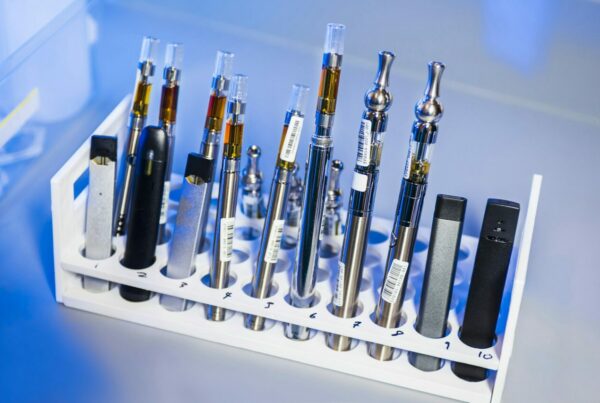The compound N, N-Dimethyltryptamine (DMT), typically found in various plants and animals, is known for its brief yet potent psychedelic effects when ingested.
Evidence is mounting that DMT, which naturally occurs in the body, plays crucial roles in both the peripheral and central nervous systems, potentially functioning as a neurotransmitter.
DMT has the capability to produce strong psychedelic effects. While it generally does not cause many negative side effects, it might lead to cardiovascular complications when administered in large amounts through injection.
Let’s explore DMT and its diverse functions, from recreational use to its fascinating potential for scientific research and therapeutic applications.

DMT in a Nutshell: What is it?
| Characteristic | Details |
| Name | N, N-Dimethyltryptamine (DMT) |
| Type | Indole alkaloid |
| Presence | Naturally occurs in a variety of plants and animals |
| Psychoactive Effects | Produces brief but potent psychedelic experiences when ingested. |
| Method of Intake | Can be smoked, injected, or consumed orally. |
| Duration of Effects | Effects are typically short-lived, ranging from 5 to 30 minutes. |
| Chemical Structure | Features a tryptamine core with two methyl groups attached to the amine nitrogen atom. |
| Metabolism | Rapidly metabolized by the body, broken down by monoamine oxidase (MAO). |
| Historical Use | Historically used in various ceremonial and shamanic rituals by indigenous cultures. |
| Alternative Names | Dimitrifantasiabusinessman’s tripBusinessman’s special45-minute psychosisspiritual molecule |
DMT’s Role in Mental Health
N, N-Dimethyltryptamine (DMT), a compound famous for its potent psychedelic effects, is drawing attention for its potential benefits to mental health. Despite being traditionally known for inducing intense visionary experiences, recent research suggests a connection between DMT and psychological well-being.
Effects on Psychological and Emotional Well-being
DMT is known for its psychedelic effects which are recognized for inducing deep emotional reactions and altering states of consciousness. This holds potential for opening new therapeutic pathways to address mental health problems, facilitate emotional processing, and provide new perspectives on personal traumas.
Neuroplasticity and Brain Function
Research suggests that DMT may influence neuroplasticity, thereby enhancing the brain’s ability to adapt and reorganize. Investigating its impact on synaptic plasticity and neural connectivity may lead to potential treatments for conditions associated with neural maladjustment.
Potential Therapeutic Use for Mental Health Disorders
Initial studies underscore the potential of DMT in treating disorders such as depression, addiction, and PTSD. Its ability to induce mystical or spiritual experiences could offer a novel approach to psychotherapy and aid in restructuring negative thought patterns.
Examining the natural presence of DMT within the body indicates its significance in mental health resilience, stress management, and overall psychological well-being. Understanding how the body controls internal DMT levels could lay the groundwork for novel therapeutic strategies.
DMT and Mental Health Disorders
| Mental Health Disorder | Description | Effectiveness of DMT | Advantages |
| Depression | Defined by an ongoing mood disorder characterized by persistent sadness, loss of interest, and reduced motivation | Preliminary research suggests DMT may mitigate symptoms by inducing profound emotional experiences. | Its rapid onset and ability to stimulate transformative experiences may offer innovative therapeutic techniques for changing negative thought patterns and enhancing emotional processing |
| Post-Traumatic Stress Disorder (PTSD) | A mental disorder triggered by distressing events resulting in flashbacks, intense anxiety, and intrusive thoughts | Emerging research indicates DMT’s potential to control symptoms by inducing spiritual or mystical experiences that could help patients reframe traumatic memories | DMT’s potential to stimulate altered states of consciousness may facilitate emotional processing and provide a new perspective on traumatic experiences |
| Addiction | A complex disorder marked by compulsive engagement in rewarding stimuli despite adverse consequences | Certain studies suggest DMT’s role in interrupting addictive patterns and diminishing substance cravings | DMT’s capacity to trigger intense and transformative experiences may aid individuals in modifying their behavioral patterns and addressing underlying reasons for their addiction |
Approach to Utilizing DMT
DMT, renowned for its short yet profound psychedelic effects, can be administered in a number of ways. The chosen method often hinges on the desired intensity and duration of the experience.
Smoking:
DMT, when smoked in a pipe or vaporized, necessitates precise temperature control to stop the compound from overheating and burning. The psychedelic effects of smoked DMT tend to manifest almost instantly and typically persist for 5 to 15 minutes.
Oral Intake:
Consuming DMT orally leads to slower onset effects that last considerably longer, often several hours, due to the slower metabolism of DMT when paired with an MAOI.
Injection:
DMT can be administered directly into the bloodstream for quick and potent effects.
This method triggers an immediate and intense experience, but it demands precise dosing and carries higher risks.
Insufflation (Snorting):
Inhaling DMT results in a slower onset of effects compared to smoking but may provide a longer-lasting experience.
Sublingual or Buccal Administration:
When absorbed through the oral mucosa, this method serves as an alternative to smoking and provides a lengthier, albeit less intense, experience.
Determining Therapeutic Dosage: N, N-Dimethyltryptamine (DMT)
For smoking, the suggested dosage ranges from 20 to 40 mg, while for intravenous administration, the recommended dosage is 0.2 to 0.4 mg per kg of body weight. These dosage recommendations are largely relevant to clinical research and are particularly pertinent for intravenous administration.
- Higher doses administered intravenously are associated with intense visuals, temporary loss of control, and a mixed state of anxiety and euphoria
- Interestingly, lower doses have exhibited less desirable effects
- Recreational doses of smoked DMT generally vary from 40 to 50 mg, sometimes even reaching up to 100 mg
- Different doses of intravenous Individuals who’ve had near-death experiences linked with DMT (7, 14, 18, and 20 mg solutions) often report lasting enhancements in their psychological health.
Availability of DMT
ProductsOsmosis – 4-ACO-DMT Ethereal Essence Tincture
This tincture is advertised as containing 4-Acetoxy-N, N-dimethyltryptamine (4-AcO-DMT), a DMT variant. Tinctures, being liquid extracts meant for oral consumption, could offer a distinct experience compared to typical DMT.
Lucid Supply Co. – 5-MeO DMT Vaporizer
This product is a vaporizer designed to deliver 5-Methoxy-N, N-dimethyltryptamine (5-MeO-DMT). The active ingredient, 5-MeO-DMT, is renowned for its potent, transformative, and often transient experiences.
Integral Alchemist – Acacia – 1ml DMT Vape Cartridge
The Integral Alchemist’s DMT vape cartridge is pre-loaded with N, N-Dimethyltryptamine. This product is likely designed for those who prefer a discreet and convenient way of consuming DMT.
Deadhead Chemist – 5-Meo-DMT Cartridge
This cartridge houses 5-Methoxy-N, N-dimethyltryptamine (5-MeO-DMT), a substance known for its deep and powerful effects.
The potential mental health benefits may be tied to personal growth, spiritual experiences, or therapeutic applications aimed at enhancing emotional well-being.
Deadhead Chemist – N, N DMT Cartridge
Another offering from Deadhead Chemist, this cartridge houses the traditional N, N-Dimethyltryptamine. Cartridges provide a user-friendly way to consume DMT, allowing for a more consistent and controlled experience.
Concluding Remarks
The utilization of N, N-Dimethyltryptamine (DMT) in
How to ensure a safe DMT experience?
It’s critical to take necessary precautions like setting intentions, having a sober sitter present, and paying attention to the set and setting.
Mental health therapy presents a fascinating and complex journey. The compound’s ability to induce powerful, albeit temporary, psychedelic experiences opens the door for innovative treatment approaches.
Initial studies indicate its possible role in emotional processing, personal development, and potentially enhancing mental health treatment’s overall effectiveness. Such profound implications necessitate careful consideration and responsible use.
If you are interested in responsibly exploring DMT products, reliable sources like Shrooms Canada Online Dispensary can offer guidance and a variety of options.
Frequently Asked Questions:
What distinguishes the effects of different DMT products on mental health?
For instance, vaporizers may yield rapid effects, while tinctures or vape cartridges can provide more controlled and consistent doses.
Incorporating derivative compounds or 5-MeO-DMT can result in varying intensity levels and diverse effects on mental health.
These slight differences underline the importance of selecting a DMT product based on individual preferences and mental health goals.
Can DMT lead to enduring changes in mental health and personal development?
There are anecdotal accounts suggesting that DMT-induced experiences can bring about lasting changes in mental health and personal development.
Profound or transformational experiences, such as near-death-like experiences, are often associated with reports of sustained positive shifts in psychological health and personal growth.
Even though these experiences are intense and transient, they often catalyze self-reflection, spiritual insights, and a sense of interconnectedness or enlightenment.
Following these experiences, individuals often report a fresh perspective on life, enhanced emotional resilience, and a greater appreciation for existence.
What is the most effective way to use DMT for mental health purposes?
Making well-informed choices, which involve thorough research and understanding of the compound’s effects, is essential.
Advice from mental health professionals or experienced users can provide valuable insights into potential risks and benefits.
Understanding personal tolerance levels and mental preparedness is also crucial, as is ensuring a supportive and safe environment for the experience.
How does DMT stack up against other psychedelic treatments such as psilocybin or LSD in the context of mental health therapy?
DMT’s effects, length, and potency vary markedly from other psychedelics like psilocybin or LSD. Its relatively short duration and high intensity provide unique experiences that require specific therapeutic strategies in mental health settings, differing from approaches used for longer-duration psychedelics.
Recommended Additional Reading:





